#history and the world
Text
I get variations on this comment on my post about history misinformation all the time: "why does it matter?" Why does it matter that people believe falsehoods about history? Why does it matter if people spread history misinformation? Why does it matter if people on tumblr believe that those bronze dodecahedra were used for knitting, or that Persephone had a daughter named Mespyrian? It's not the kind of misinformation that actually hurts people, like anti-vaxx propaganda or climate change denial. It doesn't hurt anyone to believe something false about the past.
Which, one, thanks for letting me know on my post that you think my job doesn't matter and what I do is pointless, if it doesn't really matter if we know the truth or make up lies about history because lies don't hurt anyone. But two, there are lots of reasons that it matters.
It encourages us to distrust historians when they talk about other aspects of history. You might think it's harmless to believe that Pharaoh Hatshepsut was trans. It's less harmless when you're espousing that the Holocaust wasn't really about Jews because the Nazis "came for trans people first." You might think it's harmless to believe that the French royalty of Versailles pooped and urinated on the floor of the palace all the time, because they were asshole rich people anyway, who cares, we hate the rich here; it's rather less harmless when you decide that the USSR was the communist ideal and Good, Actually, and that reports of its genocidal oppression are actually lies.
It encourages anti-intellectualism in other areas of scholarship. Deciding based on your own gut that the experts don't know what they're talking about and are either too stupid to realize the truth, or maliciously hiding the truth, is how you get to anti-vaxxers and climate change denial. It is also how you come to discount housing-first solutions for homelessness or the idea that long-term sustained weight loss is both biologically unlikely and health-wise unnecessary for the majority of fat people - because they conflict with what you feel should be true. Believing what you want to be true about history, because you want to believe it, and discounting fact-based corrections because you don't want them to be true, can then bleed over into how you approach other sociological and scientific topics.
How we think about history informs how we think about the present. A lot of people want certain things to be true - this famous person from history was gay or trans, this sexist story was actually feminist in its origin - because we want proof that gay people, trans people, and women deserve to be respected, and this gives evidence to prove we once were and deserve to be. But let me tell you a different story: on Thanksgiving of 2016, I was at a family friend's house and listening to their drunk conservative relative rant, and he told me, confidently, that the Roman Empire fell because they instituted universal healthcare, which was proof that Obama was destroying America. Of course that's nonsense. But projecting what we think is true about the world back onto history, and then using that as recursive proof that that is how the world is... is shoddy scholarship, and gets used for topics you don't agree with just as much as the ones you do. We should not be encouraging this, because our politics should be informed by the truth and material reality, not how we wish the past proved us right.
It frequently reinforces "Good vs. Bad" dichotomies that are at best unhelpful and at worst victim-blaming. A very common thread of historical misinformation on tumblr is about the innocence or benevolence of oppressed groups, slandered by oppressors who were far worse. This very frequently has truth to it - but makes the lies hard to separate out. It often simplifies the narrative, and implies that the reason that colonialism and oppression were bad was because the victims were Good and didn't deserve it... not because colonialism and oppression are bad. You see this sometimes with radical feminist mother goddess Neolithic feminist utopia stuff, but you also see it a lot regarding Native American and African history. I have seen people earnestly argue that Aztecs did not practice human sacrifice, that that was a lie made up by the Spanish to slander them. That is not true. Human sacrifice was part of Aztec, Maya, and many Central American war/religious practices. They are significantly more complex than often presented, and came from a captive-based system of warfare that significantly reduced the number of people who got killed in war compared to European styles of war that primarily killed people on the battlefield rather than taking them captive for sacrifice... but the human sacrifice was real and did happen. This can often come off with the implications of a 'noble savage' or an 'innocent victim' that implies that the bad things the Spanish conquistadors did were bad because the victims were innocent or good. This is a very easy trap to fall into; if the victims were good, they didn't deserve it. Right? This logic is dangerous when you are presented with a person or group who did something bad... you're caught in a bind. Did they deserve their injustice or oppression because they did something bad? This kind of logic drives a lot of transphobia, homophobia, racism, and defenses of Kyle Rittenhouse today. The answer to a colonialist logic of "The Aztecs deserved to be conquered because they did human sacrifice and that's bad" is not "The Aztecs didn't do human sacrifice actually, that's just Spanish propaganda" (which is a lie) it should be "We Americans do human sacrifice all the god damn time with our forever wars in the Middle East, we just don't call it that. We use bullets and bombs rather than obsidian knives but we kill way, way more people in the name of our country. What does that make us? Maybe genocide is not okay regardless of if you think the people are weird and scary." It becomes hard to square your ethics of the Innocent Victim and Lying Perpetrator when you see real, complicated, individual-level and group-level interactions, where no group is made up of members who are all completely pure and good, and they don't deserve to be oppressed anyway.
It makes you an unwitting tool of the oppressor. The favorite, favorite allegation transphobes level at trans people, and conservatives at queer people, is that we're lying to push the Gay Agenda. We're liars or deluded fools. If you say something about queer or trans history that's easy to debunk as false, you have permanently hurt your credibility - and the cause of queer history. It makes you easy to write off as a liar or a deluded fool who needs misinformation to make your case. If you say Louisa May Alcott was trans, that's easy to counter with "there is literally no evidence of that, and lots of evidence that she was fine being a woman," and instantly tanks your credibility going forward, so when you then say James Barry was trans and push back against a novel or biopic that treats James Barry as a woman, you get "you don't know what you're talking about, didn't you say Louisa May Alcott was trans too?" TERFs love to call trans people liars - do not hand them ammunition, not even a single bullet. Make sure you can back up what you say with facts and evidence. This is true of homophobes, of racists, of sexists. Be confident of your facts, and have facts to give to the hopeful and questioning learners who you are relating this story to, or the bigots who you are telling off, because misinformation can only hurt you and your cause.
It makes the queer, female, POC, or other marginalized listeners hurt, sad, and betrayed when something they thought was a reflection of their own experiences turns out not to be real. This is a good response to a performance art piece purporting to tell a real story of gay WWI soldiers, until the author revealed it as fiction. Why would you want to set yourself up for disappointment like that? Why would you want to risk inflicting that disappointment and betrayal on anyone else?
It makes it harder to learn the actual truth.
Historical misinformation has consequences, and those consequences are best avoided - by checking your facts, citing your sources, and taking the time and effort to make sure you are actually telling the truth.
14K notes
·
View notes
Text
Old Lighters 🤔
#pay attention#educate yourselves#educate yourself#knowledge is power#reeducate yourself#reeducate yourselves#think about it#think for yourselves#think for yourself#do your homework#do some research#do your own research#ask yourself questions#question everything#old lighters#lighters#antique#history lesson#history#american history#world history#ancient history
19K notes
·
View notes
Text
The nazis that you see in movies are as much a historical fantasy as vikings with horned helmets and samurai cutting people in half.
The nazis were not some vague evil that wanted to hurt people for the sake of hurting them. They had specific goals which furthered a far right agenda, and they wanted to do harm to very specific groups, (largely slavs, jews, Romani, queer people, communists/leftists, and disabled people.)
The nazis didn't use soldiers in creepy gas masks as their main imagery that they sold to the german people, they used blond haired blue eyed families. Nor did they stand up on podiums saying that would wage an endless and brutal war, they gave speeches about protecting white Christian society from degenerates just like how conservatives do today.
Nazis weren't atheists or pagans. They were deeply Christian and Christianity was part of their ideology just like it is for modern conservatives. They spoke at lengths about defending their Christian nation from godless leftism. The ones who hated the catholic church hated it for protestant reasons. Nazi occultism was fringe within the party and never expected to become mainstream, and those occultists were still Christian, none of them ever claimed to be Satanists or Asatru.
Nazis were also not queer or disabled. They killed those groups, before they had a chance to kill almost anyone else actually. Despite the amount of disabled nazis or queer/queer coded nazis you'll see in movies and on TV, in reality they were very cishet and very able bodied. There was one high ranking nazi early on who was gay and the other nazis killed him for that. Saying the nazis were gay or disabled makes about as much sense as saying they were Jewish.
The nazis weren't mentally ill. As previously mentioned they hated disabled people, and this unquestionably included anyone neurodivergent. When the surviving nazi war criminals were given psychological tests after the war, they were shown to be some of the most neurotypical people out there.
The nazis weren't socialists. Full stop. They hated socialists. They got elected on hating socialists. They killed socialists. Hating all forms of lefitsm was a big part of their ideology, and especially a big part of how they sold themselves.
The nazis were not the supervillians you see on screen, not because they didn't do horrible things in real life, they most certainly did, but because they weren't that vague apolitical evil that exists for white American action heros to fight. They did horrible things because they had a right wing authoritarian political ideology, an ideology that is fundamentally the same as what most of the modern right wing believes.
#196#my thougts#leftist#leftism#jewish#jumblr#actually mentally ill#mental illness#neurodivergent#actually neurodivergent#world war 2#world war ii#history#queer#gay#queer history#pagan#athiest#athiesm#disability rights#communist#communism#socialist#socialism#anti conservative#anti christianity#christanity#christianity#mad pride#madpunk
9K notes
·
View notes
Text
America has now bombed and conducted illegal wars in:
- Iraq
- Syria
- Libya
- Somalia
- Pakistan
- Afghanistan
- Palestine
- Yemen
But Muslims are the terrorists?
#free palestine#palestine#gaza#palestine will be free#yemen#free yemen#iraq#libya#somalia#pakistan#america#israel is a terrorist state#israel terrorist#israel massacre#ethnic cleansing#end the occupation#occupied palestine#occupation#world history#gaza genocide#ceasfire now#ceasefire now#new year 2024#muslim#islam
8K notes
·
View notes
Text

I just posted a thread on the history of colonialism and ongoing oppressive Indonesian occupation of West Papua. If you have time, please read the educational slides. This is absolutely horrendous, and has been going on for decades. The Indonesian government and military must be held accountable. Free West Papua.
#feminist#social justice#settler violence#settler colonialism#current events#current news#free west papua#west papua#history#indonesia#colonial violence#colonialism#global news#world news#torture tw#end the occupation
6K notes
·
View notes
Text

Congo is silently going through a silent genocide. Millions of people are being killed so that the western world can benefit from its natural resources.
More than 60% of the world's cobalt reserves are found in Congo, used in the production of smartphones.
Western countries are providing financial military aid to invade regions filled with reserves and in the process millions are getting killed and millions homeless.
Multinational mining companies are enslaving people especially children to mine.
•••
La República Democrática del Congo vive un genocidio silencioso. Millones de personas están siendo asesinadas para que la parte occidental del mundo pueda beneficiarse de sus recursos naturales.
Más del 60% de las reservas mundiales de cobalto se encuentran en el Congo, y se utiliza en la producción de teléfonos inteligentes.
Los países occidentales están proporcionando asistencia financiera militar para invadir regiones llenas de reservas y en el proceso millones de personas mueren y millones se quedan sin hogar.
Las empresas mineras multinacionales están esclavizando a la gente, especialmente a los niños, para trabajar en las minas.
Street Art and Photo by Artist Eduardo Relero
(https://eduardorelero.com)
#blacklivesmatter#blacklivesalwaysmatter#english#spanish#blackhistory#history#share#blackhistorymonth#blackpeoplematter#black history matters#black history 2023#black history is everybody's history#historyfacts#black history is world history#black history is american history#african history#black history#black history month#modern slavery#knowyourhistory#congo genocide#dr congo#blackbloggers#like#blackhistoryyear#follow#cobalt#blackownedandoperated#culture#art
11K notes
·
View notes
Text
We ask your questions so you don’t have to! Submit your questions to have them posted anonymously as polls.
#ancestry#heritage#family history#genealogy#polls#incognito polls#anonymous#tumblr polls#questions#tumblr users#polls about the world
9K notes
·
View notes
Text
friend wanted to see my tumblr, and when i told him i can’t show it to him bc it’s basically my personal diary he went “oh so I can’t see it but a bunch of strangers on tumblr can??” he literally does not get me. no one will get me like the people in my phone get me
#It’s just so different#even though it’s public it still feels secret and safe. i feel comfy sharing a lot more on here than I do in my actual day to day life lol#in my head I’m also just speaking to myself 90% of the time which helps#if a friend off tumblr saw my thoughts I’d feel so weird ab it#esp bc they might get the vagueposting about certain situations and tell mutual friends#no thank u. this is for me. I’m not about to start censoring my thoughts bc someone I know knows my tumblr#u guys literally saw me have LIVE BREAKDOWNS#meanwhile I’ll have the worst fucking day in history and tell no one about it. I’m already cripplingly private but way more so in real life#this is basically a low stress journaling outlet for me. it’s so important for me to maintain the separation#like this is actually my diary & has been so handy for letting out emotions / articulating thoughts / staying on track !!#& I’ve met so many kind people on here who actually get me. which is so hard to find irl bc I’m surrounded by pre-med gunners/overachievers#who are by standard not very good w emotion & can be competitive/judgmental. or at least it’s hard for me to be vulnerable in front of them#and I’m part of that crowd so I reserve my emotions only to a handful of very close friends#it’s nice to hop on here and express negative emotions!! or positive emotions!! just whatever I want and it’s low stress and people get me#I don’t have to worry about judgment or competitiveness etc etc#like everyone on here is so kind & nice & understanding. & just a breath of fresh air from the types I run w. it’s just nice to have this#so idk that’s why I think I’ll always be strict about keeping the worlds separate. it just works#p
6K notes
·
View notes
Text
Facing The Facts: Resources on the Armenian Genocide

Frequently Asked Questions About Armenian Genocide
Sample Archival Documents on the Armenian Genocide: U.S. Archives
Sample Archival Documents on the Armenian Genocide: British Archives
Map of the 1915 Armenian Genocide in the Turkish Empire
Talaat Pasha's Official Orders Regarding the Armenian Massacres, March 1915-January 1916
The Massacre of the Armenians (”Ambassador Morgenthau describes the forced evacuation of one group of Armenians from their homeland to the Syrian desert.”)
American Documents
British Documents
Russian Documents
French Documents
Austrian Documents
Public Lectures
Eye Witnesses
The Turkish Woman
That is all right, but who killed hundred of thousands Armenians?
Einar af Wirsen
The Story of Anna Hedwig Bull, an Estonian Missionary of the Armenian Genocide.
"That's How It Was"
ARAB EYEWITNESS FAYEZ ALGHUSSEIN ABOUT THE ARMENIAN GENOCIDE
Report by an Eye-Witness, Lieutenant Sayied Ahmed Moukhtar Baas
Letters of Turkish doctors addressed to the Ministry of Internal Affairs of Turkey
Martyred Armenia: Eyewitness account of the Armenian genocide by Faiz El-Ghusein a Turkish official
PHOTO COLLECTION OF ARMENIAN GENOCIDE
#in case you'd like to break the chain of ignorance#history#armenian history#armenian genocide#literature#1915#world history#world war 1#april 24
3K notes
·
View notes
Text
Public Domain Black History Books
For the day Frederick Douglass celebrated as his birthday (February 14, Douglass Day, and the reason February is Black History Month), here's a selection of historical books by Black authors covering various aspects of Black history (mostly in the US) that you can download For Free, Legally And Easily!
Slave Narratives
This comprised a hugely influential genre of Black writing throughout the 1800s - memoirs of people born (or kidnapped) into slavery, their experiences, and their escapes. These were often published to fuel the abolitionist movement against slavery in the 1820s-1860s and are graphic and uncompromising about the horrors of slavery, the redemptive power of literacy, and the importance of abolitionist support.
Narrative of the Life of Frederick Douglass - 1845 - one of the most iconic autobiographies of the 1800s, covering his early life when he was enslaved in Maryland, and his escape to Massachusetts where he became a leading figure in the abolition movement.
Running a Thousand Miles for Freedom by William and Ellen Craft - 1860 - the memoir of a married couple's escape from slavery in Georgia, to Philadelphia and eventually to England. Ellen Craft was half-white, the child of her enslaver, but she could pass as white, and she posed as her husband William's owner to get them both out of the slave states. Harrowing, tense, and eminently readable - I honestly think Part 1 should be assigned reading in every American high school in the antebellum unit.
Incidents in the Life of a Slave Girl by Harriet Jacobs writing under the name Linda Brent - 1861 - writing specifically to reach white women and arguing for the need for sisterhood and solidarity between white and Black women, Jacobs writes of her childhood in slavery and how terrible it was for women and mothers even under supposedly "nice" masters including supposedly "nice" white women.
Twelve Years a Slave by Solomon Northup - 1853 - Born a free Black man in New York, Northup was kidnapped into slavery as an adult and sold south to Louisiana. This memoir of the brutality he endured was the basis of the 2013 Oscar-winning movie.
Early 1900s Black Life and Philosophy
Slavery is of course not the only aspect of Black history, and writers in the late 1800s and early 1900s had their own concerns, experiences, and perspectives on what it meant to be Black.
Up From Slavery by Booker T. Washington - 1901 - an autobiography of one of the most prominent African-American leaders and educators in the late 1800s/early 1900s, about his experiences both learning and teaching, and the power and importance of equal education. Race relations in the Reconstruction era Southern US are a major concern, and his hope that education and equal dignity could lead to mutual respect has... a long way to go still.
The Souls of Black Folk by W.E.B. Du Bois - 1903 - an iconic work of sociology and advocacy about the African-American experience as a people, class, and community. We read selections from this in Anthropology Theory but I think it should be more widely read than just assigned in college classes.
Darkwater: Voices from Within the Veil by W.E.B. Du Bois - 1920 - collected essays and poems on race, religion, gender, politics, and society.
A Negro Explorer at the North Pole by Matthew Henson - 1908 - Black history doesn't have to be about racism. Matthew Henson was a sailor and explorer and was the longtime companion and expedition partner of Robert Peary. This is his adventure-memoir of the expedition that reached the North Pole. (Though his descriptions of the Indigenous Greenlandic Inuit people are... really paternalistic in uncomfortable ways even when he's trying to be supportive.)
Poetry
Standard Ebooks also compiles poetry collections, and here are some by Black authors.
Langston Hughes - 1920s - probably the most famous poet of the Harlem Renaissance.
James Weldon Johnson - early 1900s through 1920s - tends to be in a more traditionalist style than Hughes, and he preferred the term for the 1920s proliferation of African-American art "the flowering of Negro literature."
Sarah Louisa Forten Purvis - 1830s - a Black abolitionist poet, this is more of a chapbook of her work that was published in newspapers than a full book collection. There are very common early-1800s poetry themes of love, family, religion, and nostalgia, but overwhelmingly her topic was abolition and anti-slavery, appealing to a shared womanhood.
Science Fiction
This is Black history to me - Samuel Delany's first published novel, The Jewels of Aptor, a sci-fi adventure from the early 60s that encapsulates a lot of early 60s thoughts and anxieties. New agey religion, forgotten technology mistaken for magic, psychic powers, nuclear war, post-nuclear society that feels more like a fantasy kingdom than a sci-fi world until they sail for the island that still has all the high tech that no one really knows how to use... it's a quick and entertaining read.
59 notes
·
View notes
Text
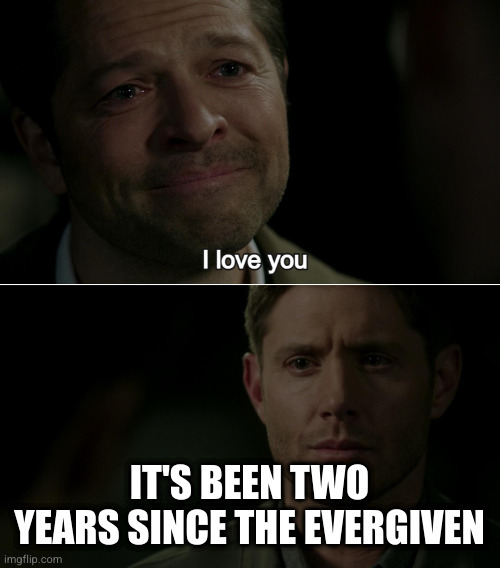
#ever given#world history#history#suez canal#i miss that time#it was so chaotic it was great#evergiven
14K notes
·
View notes
Note
Thank you for defending Nazis. They're just little guys. Just misunderstood, with genuine grievances. I noticed you accidentally forgot to defend child rapists. Dumb commies like you are all the same 🙄
Piss on the poor! Also I'm not a commie and never claimed to be one.
#anyway 'Germany was hurting after WWI which allowed Hitler to rise to power'#and 'antisemitism was escalating at an alarming rate which created a very dangerous situation for Europe's Jewish population'#and 'by leaning into the antisemitism that already existed in Germany at the time Hitler was able to rapidly radicalize Germany's population#are all just like. history. ever read a world history textbook or did you sleep all through your history classes?#case in point if you're not able to identify why or how things got that bad then you're doomed to follow the same path
5K notes
·
View notes
Text
The trouble with self-consciously edgy urban fantasy RPGs which are explicitly set in the real world is that they always get fixated on the Second World War, and there's literally no good way to speculate about whether Hitler was a vampire or whatever – not only is it tasteless, it's done. It was cliché even in the 1990s, and it hasn't become any less cliché since. Like, at least switch up the war – I want to see an edgy urban fantasy RPG whose Secret History™ revolves around the proposition that Archduke Franz Ferdinand was from space.
#gaming#tabletop roleplaying#tabletop rpgs#game design#worldbuilding#urban fantasy#history#world war i#world war ii#nazi mention
2K notes
·
View notes
Text

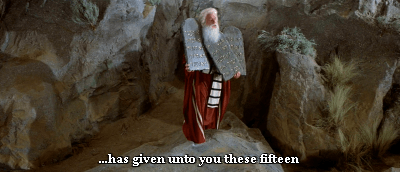

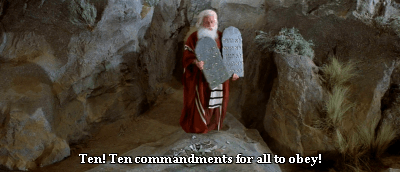
Mel Brooks as Moses - History of the World, Part I (1981)
#mel brooks gif#history of the world part 1 gif#80s comedies#moses#the ten commandments#80s movies#1980s#1981#gif#chronoscaph gif
2K notes
·
View notes
Text

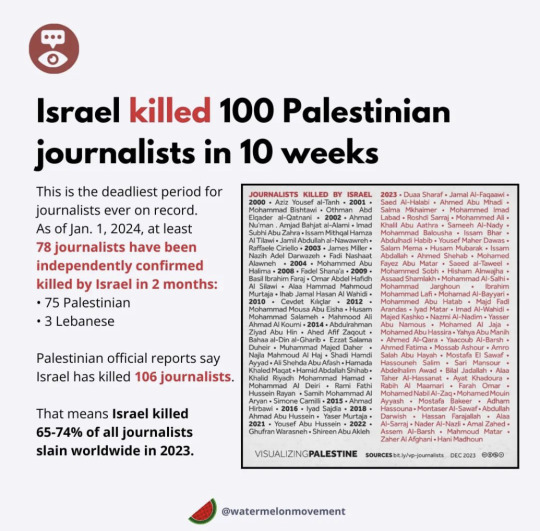


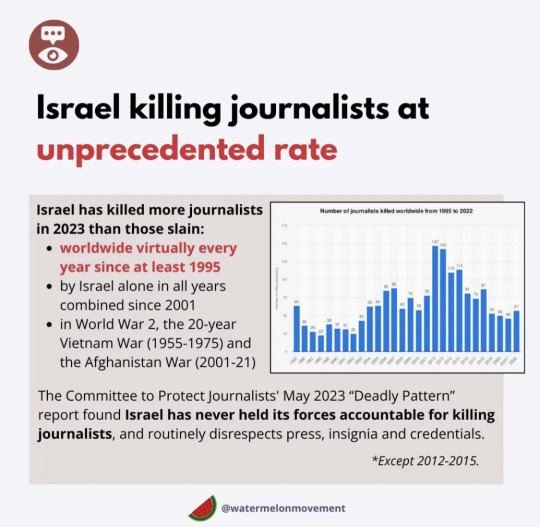

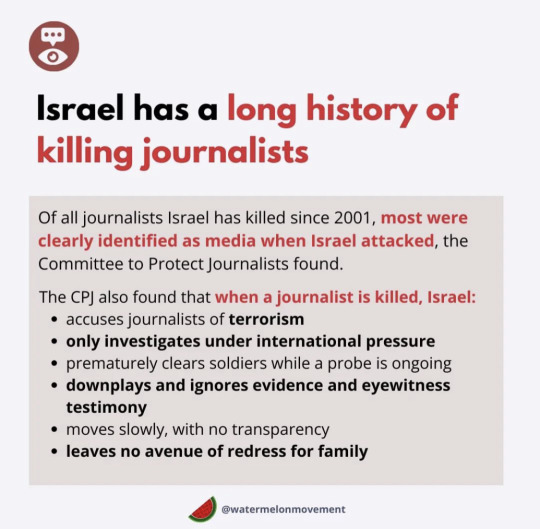


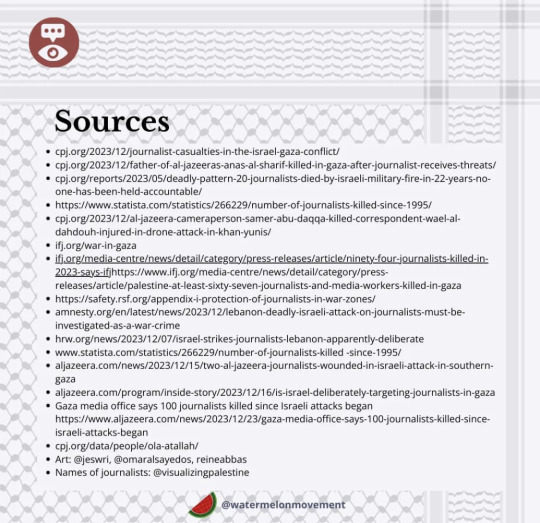
Journalism has a vital role in shedding light on what entities like Israel want to keep in the dark.
Israel killed over 100 journalists in 10 weeks.
#free palestine#palestine#gaza#palestine will be free#journalist#the press#freepalastine🇵🇸#israel is a terrorist state#israel crimes#israel massacre#stop israel#journalism#world history#crimes against humanity#press#fuck israel#end the occupation#ethnic cleansing#gaza genocide#stop genocide#genocide#gaza journalists#tel aviv#stop killing civilians#ceasefire now#middle east
3K notes
·
View notes
Text
This is a comment from the video on Watchers latest decision on Coffeezilla's side channel that just about sums up my opinion as well (video linked below the cut)
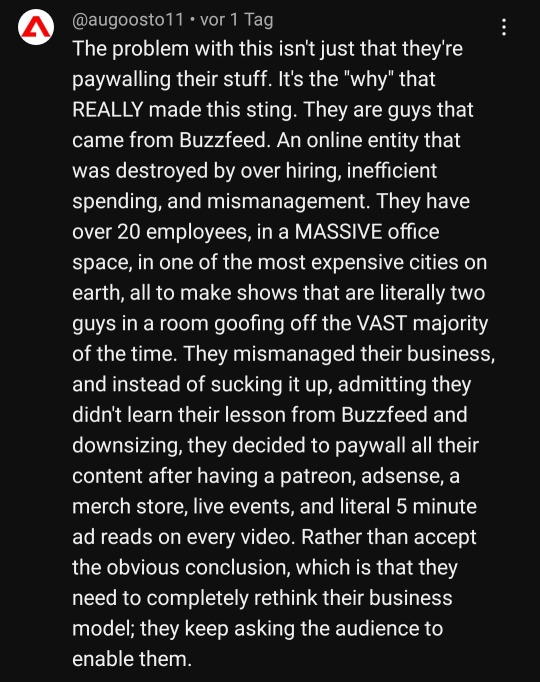
youtube
#watcher#watcher entertainment#ryan bergara#shane madej#steven lim#ghoul boys#puppet history#weird wonderful world#top 5 beatdown#ghost files#mystery files#dish granted#grocery run#tourist trapped#Youtube#1k#1.5k#2k
2K notes
·
View notes